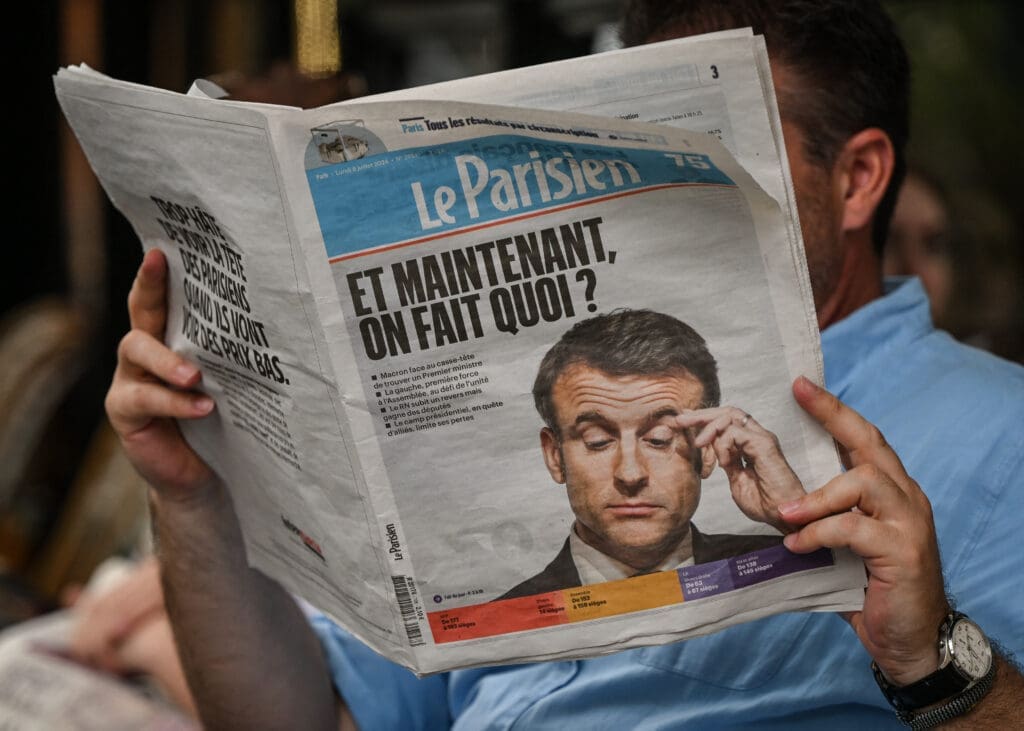During recent elections to the European Parliament, France’s far right National Rally (Rassemblement National) party led by Marine Le Pen won a resounding victory. In a surprise response, French President Emmanuel Macron dissolved his country’s parliament and called for immediate elections. Yet, despite a strong showing in the first round, the National Rally ultimately came in third place in the run-offs while a left-wing coalition called the New Popular Front secured the most seats, followed by Macron’s centrist bloc. With no party securing a majority, there is significant uncertainty over the next coalition government’s ability to function amid divisions over the war on Gaza, immigration problems, and other policy issues. In this interview with Afkār, Joseph Bahout, Director of the Issam Fares Institute at the American University of Beirut, unpacks the potential consequences of the French elections on the country’s policies toward the Middle East and North Africa.
What do the elections results mean for France’s internal politics? What composition is the new government likely to assume, and how will this impact President Macron’s ability to steer the country’s domestic and foreign policy?
President Macron’s decision to dissolve the French parliament and call for snap elections a few hours after the results of European elections was already a surprising, and for many a very risky, decision. While the president was pushing for and expecting a “clarification” of the French political landscape, the result that he and the country got was the exact opposite: one with no clear majority and blocs composed of disparate, small parties unable to go beyond very shallow agreements. With such a parliament emerging, it will be almost impossible to form a stable government, notwithstanding one that will be able to function smoothly with a president given huge powers by the constitution. With France already facing paralysis and an inability to address the most immediate domestic challenges (retirement age, minimal wage, emigration legislation, etc.), the new parliamentary composition will almost certainly cause a gradual erosion of France’s presence and effectivity on the international scene. France’s strong influence in European decisions, particularly on Ukraine, will be increasingly contested, and its initiatives in the Middle East, especially in Lebanon, will be strongly diminished. Ultimately, France’s political life will, as of now, start to be oriented towards the coming presidential elections in 2027, and thus, automatically, towards Macron’s succession—a battle raging even within his own camp that further erodes the president’s stature and moral authority.
Amid rising Israel-Hezbollah tensions since October 7, France’s foreign ministry has actively attempted to mediate a truce between the two parties and de-escalate. How might the recent elections impact France’s role in the Middle East, especially regarding these ceasefire efforts and Israel’s ongoing war on Gaza?
France has been very active in the Lebanese sphere under Macron, conducting various political initiatives starting amid the 2019 civil unrest and subsequent political deadlocks, continuing after the Beirut port explosion in 2020, and then with the presidential vacuum that opened in 2022. These initiatives, however, have not always been coherent, oscillating between trying to maintain the status quo and supporting forces of change.
When it comes to its involvement in Lebanese domestic politics, France’s scope of action has been seriously limited by its integration into the collective efforts of the Quintet, alongside the U.S., Saudi Arabia, Qatar, and Egypt. When the Gaza War broke out, France then tried to take a lead on de-escalation efforts in the south of Lebanon, to prevent a full-fledged war between Israel and Hezbollah. Here also, however, Paris first had to confront, then to coexist, with much more forceful efforts initiated by U.S. Special Envoy Amos Hochstein, and later on with a very discrete mediation effort led by Germany’s intelligence service. While on that level France remains an important actor—mainly due to the significant French contingent within UNIFIL, the UN force on the Lebanese-Israel border, and consequently French technical support to the Lebanese army—it must now coordinate with other mediators, something that is not always smoothly done. What further complicates this is the fact that the South Lebanon file is often linked, de facto or by design, to Lebanese domestic issues, particularly the inability to decide on a president since 2022, an aspect of renewed irritation between Paris, Washington, and also Riyadh.
As for Gaza, President Macron tried in the first weeks of the conflict to position himself as a mediator. But his efforts were quickly tarnished, and largely paralyzed, when he suggested that the international coalition against ISIS also carry out operations against Hamas—an idea that was unwelcomed by all parties without exception. Still, the Gaza war has become an integral component of the French domestic split, mainly since the left—in particular, its extreme component France Unbowed, or La France Insoumise (LFI)—has been accused of openly supporting Hamas and some political opponents have even labeled it “antisemitic.” In the case a leftist coalition was to form a government, it has already been stated that it would push for the recognition of a Palestinian state—a move that Macron is still reluctant to endorse.
The far-right National Rally and leftist New Popular Front hold starkly different views on France’s relations with countries across the African continent, particularly in North Africa and the Sahel regions. Now that French leaders must form a coalition government, what are the implications for the country’s engagement with North Africa and its immigration and aid policies?
Any potential governmental coalition will most probably not put together the extreme right (National Rally) and extreme left (LFI, or even the New Popular Front); it will be “either-or.” But in any case, France’s foreign policy is, by customary tradition but also through the reading of certain articles in the constitution—as famously done by President Charles de Gaulle—a domain reserved for the president of the republic. This means that a certain continuity is to be expected. But here a very fascinating question arises from the new and odd political landscape in the country: what if the prime minister, benefiting from a relative majority, decides to challenge the president on a foreign policy decision? This is still a bit theoretical but could well become a real issue, the outcome of which will mainly depend on the balance of powers between the two personalities and Macron’s ability, or inability, to keep a certain amount of political capital domestically and abroad. On immigration more specifically—and this is a domestic issue—it is very probable that any left-of-center coalition forming a government will try to revert some of the provisions within the law. In particular, the leftists will target legislation that the previous majority was able to pass last winter, which was perceived, even in some segments of the Macronist camp, as unacceptable in regards to human rights and humanitarian law considerations. Nevertheless, the general climate among the public is such that there is an implicit, society-wide consensus on the necessity to curb immigration, and any political force strongly challenging that will most probably lose some political capital.


